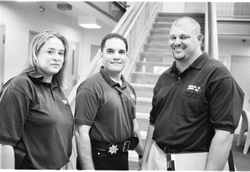Dragon Info r
|
Stanislaus County Juvenile Hall July-August 2001
Like most of the nearly 60 Stanislaus County Juvenile Hall group supervisors, Louie Naranjo got into this sometimes difficult and stressful job because he felt he could make a difference. “I had worked in the recreation field and felt I could make a difference working with troubled youth.They’re teen-agers, they test us all the time. Sometimes it’s real hard, but at the same time, once you achieve a working relationship with these kids and develop their trust, this job can be rewarding. I’ll see kids years later when they’re 21 or 22. They’ll be in college or working and they’ll thank me for keeping them out of jail or worse. That makes you feel good,” he said. Juveniles are booked into juvenile hall for violations of probation or criminal activity or are sent there from placement homes. Some stay for an hour, others for a month; the average is a week to 10 days. But all must remain there until the courts decide in what manner they will be released. Juvenile hall has initiated new programs so that minors can be released into programs outside of the facility, yet maintain some connection. The electronic release program is one of those. Kids wear an electronic device around their ankles so they can stay at home, go to school, yet be monitored 24 hours a day. The house arrest program releases minors to home supervision, and they must stay at home for a period of time. “This way, kids can be out of juvenile hall, yet we can continue to monitor their activities so they won’t get into trouble and wind up back here,” adds Naranjo. “It’s very effective and a cheaper alternative to being locked up.” At juvenile hall, children attend school, receive three meals a day, are given clothing and seen by health care workers, all under one roof. The six units house more than 100 kids, divided up according to severity of crimes. The majority are in for violation of probation, but many are there for serious crimes, including murder. Juvenile hall has an 80% recidivism rate.
“We know them and they know us. We see minors from all kinds of economic backgrounds, but poverty and lack of a family has a lot to do with why they are here. But some tell us they’d rather be here because they are given three meals a day, a change of clothing, and a place to stay. In the outside, they are homeless,” adds Naranjo. “We have to be on our toes” Group supervisor Lorie Van Ruiten works in the court commitment unit. It’s designed for minors who have been to court, completed the court process, and will be released on a specific date. During the first part of their confinement, most kids stay in the larger units. But as their behavior improves, they move into single room units to give them an opportunity to go out and work. “Half the guys work around the building, some are in the kitchen, and others are folding clothes. They can help anywhere in the facility and outside of the facility. It’s a privilege they have earned. There’s less chance of these individuals running because they know they’re going home within two weeks,” says Van Ruiten. Group supervisors have to be on their toes, made more difficult by the continuous staffing problems and high turnover. “I worked the 3 to 11 shift last night and came back at 7 this morning, and will be here until 11 tonight. You get tired. When you get tired you don’t pay as close attention to what people pick up, what they say, what they take with them, and what they turn in. Fatigue puts you and the kids in danger. At the same time we’re grateful for the extra money for overtime, we have to be careful we’re not putting staff and kids in jeopardy,” notes Van Ruiten.
The hardest part of Van Ruiten’s job is treating
each kid the same even with the knowledge of what they have done. “What
they have done doesn’t affect how I treat them,” says Van Ruiten.
“No matter how bad it is. Murder, rape, assault with a deadly weapon,
something like that. It’s not for me to judge them. My job is to
make sure everybody here is safe. You don’t trust anybody. The one
time you let your guard down, something could happen, so I don’t
do it. We owe it to their parents to make sure, when they’re here,
they’re safe. When it comes to security, I don’t give in, but
I treat everybody the same.” Van Ruiten usually works in the maximum security unit,
with nearly all boys. When she first went to work there 23 years ago,
females were not allowed to work with males. She became the first female
in Stanislaus County to be put in an all boys unit. “When I first
came here I thought I was going to save the world. I realize now that’s
not exactly the case. A lot of these kids have bad home lives which makes
it really tough. I wish I could do more than I do.” “I quit after the first day” “I quit after the first day but went back the next day and have been here ever since. In those days it felt like you were in riot mode all the time. I remember when we had our first car thief and it was a big deal. Today, you put a car thief on house arrest.The philosophy’s changed over the years, as well as the children. They’re more violent in some ways and less violent in others. Murder’s not a big deal with kids anymore. Everybody’s a tough guy if they’ve got a gun. If they don’t have a gun they’re just scared little boys. We’ve grown too. We’ve learned how to deal with kids. We’re easier on ‘em, we’re not physical anymore and that’s better. Though the kids are more violent, we’ve become more gentle. As a result, it’s a lot safer for everybody. If we finish every shift mentally and physically safe, it’s been a great day.” Anderson also finds turnover to be a big problem at juvenile hall. “People look at this job as a stepping stone to the probation department and probation as a stepping off place to parole. But the kids suffer as a result. Working with kids is not something you learn overnight. I can teach you fundamentals of security, but it takes years to learn how to handle a kid. It really comes down to common sense. When I first started here I was afraid and got into altercations with kids. You say go to your room son. He says no, put me there. You approach him and he clocks you a couple of times. I’ve been picked off the ground and pinned to a wall. I’ve learned, if a kid tells you, ‘I’m not going to wear this shirt, there’s a hole in it’, you don’t get physical with him, you get him a new shirt, it’s that simple. You going to shed blood over a shirt? Of course not. Getting into power issues with kids doesn’t work. The job doesn’t get done, and people get hurt.” “Don’t turn your back” “I respect these kids but I don’t trust them. You don’t turn your back. You always know where every kid is, and what mood they’re in. That’s just a given. I’ve seen my kids on America’s Most Wanted and read about ‘em in the obituary columns. You see the sad things, the waste, the human waste. I’ve seen kids that are super talented, brilliant, wasting away. It makes you sick. After all, they’re just teenagers. They’re crazy, they’re fun. They make me laugh. I make them laugh. I’m not here to judge them or cure them. That’s not what I’m paid for. I’m here to get them through the day and I try to do it with humor. I make them laugh, I growl a lot. You’ve got to be a great actor to work here. You’ve got to come in and growl at ‘em.” “By the time they are adults, there is much less chance at rehabiltation” “The hardest part is dealing with the same kids over and over and over,” adds group supervisor Travis Pilcher. “No matter what we say to them, what morals we instill, and all the positive things we have to offer them here, you release then back into the same environment where parents are drug addicts, gang members, or criminals, and they are sure to come back. The first time it might be for shoplifting, the next car theft, and then the next, armed robbery. I’ve seen kids graduating to prison or California Youth Authority. By the time they’re adults, there is much less of a chance at rehabilitation. “I know I’m not going to help every kid, but if I say something positive and they get the point, maybe the next time they’re tempted to do something they shouldn’t do, they think about what we’ve said, and don’t do it . Then what I said is important and it changed somebody. If you can affect one or two and they don’t come back, well, great, you did your job.”
|
||||||||||



